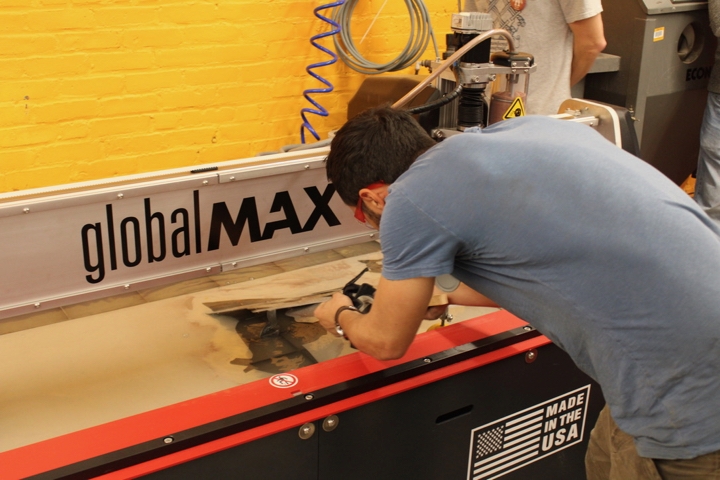
Greentown Labs
Founding Director Dings: "Addressing climate change is a moral imperative and an economic opportunity.”
A town-gown group is planning to launch a climate-focused tech start-up center in early 2023 in downtown New Haven.
The center is called ClimateHaven. It is registered for now as a for-profit corporation, but the plan is to form a nonprofit based in the former City Hall building at 770 Chapel St.
The group, which has been meeting for months, includes Joshua Geballe, Yale’s new top-level point person for promoting tech start-ups in town; SeeClickFix founder Ben Berkowitz; and representatives from the quasi-state venture capital firm Connecticut Innovations (CI) and Yale’s Elm Ventures and Center for Business and the Environment. Geballe last week described the emerging center to community leaders and others gathered at the New Haven Lawn Club for a monthly Yale Club luncheon address.
The center will be similar to a “cleantech” start-up center in Massachusetts called Greentown Labs. Geballe told the luncheon that a top official there named Ryan Dings led the visiting New Haveners on a tour of the premises — and subsequently agreed to become the director of New Haven’s ClimateHaven. Dings incorporated ClimateHaven as a non-stock corporation on Sept. 8 listing 770 Chapel as its address, according to the secretary of the state’s database.
Dings told the Independent Tuesday that a start date has not yet been set for the project. He said the U.S. Department of Energy has approved an incubator grant for ClimateHaven. (“The amount has not been finalized.”)
“ClimateHaven will provide tools, resources and networks that early-stage companies that are developing decarbonizing technologies need to scale,” said Dings, who plans to commute to the New Haven job from his home in the Boston area.
“It could include technologies [that] help us decarbonize our buildings, reduce emissions from our industrial processes, support the transition to renewals, electrify our infrastructure, all of the various types of technologies that will help us [cut] the carbon that we emit and hopefully with the support of carbon-capture technologies, allow us to achieve a state of carbon neutrality in the decade ahead.”

Paul Bass Photo
Julie Bernblum, a principal in the company that owns 770 Chapel (pictured above), said they have signed a letter of intent to allow ClimateHaven to sublease space vacated by SeeClickFix.
“It sounds like such a unique and interesting” project, Bernblum said. “It will be an asset in New Haven. There’s so much talent in New Haven that it will tap into and retain some businesses we have lost otherwise.” She said the goal is for ClimateHaven entrepreneurs to eventually grow into more space within the building.
Connecticut Innovations sees ClimateHaven as integral to the state strategy of building a green start-up culture, said Konstantine Drakonakis. Drakonakis manages the climate tech fund for CI; he has been at the table at the discussions about the emerging New Haven project.
CI has created a $100 million ClimateTech fund to “invest in innovative early-stage companies focused on energy, transportation/mobility, food/agriculture, water, climate-related software, waste/circular economy, advanced materials/manufacturing, carbon removal/sequestration and more.” Half the money for the fund came through the state from the federal Inflation Reduction Act; the rest comes from CI’s Eli Whitney Fund. He said CI is committed to tap that fund to invest in ClimateHaven start-ups.
“As they grow and need graduation space, our hope is that we’re going to fund them throughout their lifecycle and help them stay in Connecticut,” Drakonakis said. “We have a biotech hub. Let’s have a climate hub.”
Organizers made a conscious decision not to put “Yale” in the ClimateHaven name and to locate the center off campus.
“ClimateHaven is supported by Yale and will hopefully be a great catalyst for spinning out technologies from the university’s rich research ecosystem,” Dings said, while the goal is “to make this organization a really strong part of the community, to make it one that will also have a regional and global reach.
“ClimateHaven is a concept that came from a group of very passionate stakeholders from Yale, the local community, the state’s innovation ecosystem. That group of stakeholder recognizes, as do I, that addressing climate change is a moral imperative and an economic opportunity.”

Paul Bass file photo
Partners ready in the basement: “Expert Maker” Lior Trestman at work at MakeHaven.
The 770 Chapel building (which served as temporary City Hall from 1990 – 1993 during the Daniels administration) also houses MakeHaven, a 540-member “maker space” community. Organizers expect many of the entrepreneurs starting eco-focused companies inside 770 Chapel to join MakeHaven as well, making use of the equipment to create prototypes and meeting other engineers and “creatives” in the process.
MakeHaven’s JR Logan described the informal partnership as a win-win-win: It will help MakeHaven “be more sustainable,” it will help the ClimateHaven entrepreneurs, and, ideally, the resulting companies hatched there will help address the challenges of global climate change.
“The proximity to MakeHaven is an incredible resource to the entrepreneurs,” said Director Dings.
He said the organization plans to announce more details about the project in early 2023.